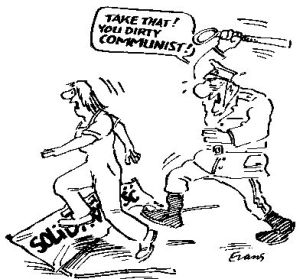MIA > Archive > P. Foot > 3 Letters
I GOT your long letter just before Christmas and have crawled away for a few hours to try to do it justice. You rebuke me for keeping silent after your last outburst of joy, written from your hotel room in Brighton during the Labour Party conference. To be honest, I felt a little uneasy about your letter, even a little embarrassed. But I also felt that to quarrel with you then would have been a little like yelling in church.
It’s not just that you were so delighted at Tony Benn’s ‘marvellous triumph’ at the conference (your very words), nor even that you were right when you said that the Left in the Labour Party had never got half as far as Tony and his supporters had.
It was, also, that I was glad at the result, and sorry he hadn’t won. Glad, if only, I suppose, to see the smile wiped off the face of Denis Healey and to see the old reactionary gang who have always regarded the Labour Party as a sort of fiefdom shaking in their shoes.
I’d been impressed, too, more than I dared admit at the campaign by Tony Benn and his supporters. Why, I wonder? I’d never been an admirer of him personally. I suppose I’ve bashed him in print just as much as anyone else in the country, even the Daily Mirror leader writers. It wasn’t even that I was specially keen on the specific policies he was advocating. As you know, I don’t much go for a ‘siege economy’ and import controls, which I regard as a lot of nationalist claptrap. And I certainly didn’t like all those eulogies about Russia which were starting to creep into Tony Benn’s speeches, and which reminded me of the sort of windy fellow-travelling which polluted the Left in the 1940s and 1950s.
I suppose what I liked was the straight appeal to socialist solutions – the open attack on capitalism and all its works.
I remember when you and I first met about twenty years ago, I remember how steamed up we got about the terrible figure of 600,000 unemployed; how we said this showed the fundamental contradictions in the capitalist system, and so on. I suspect it showed on the contrary just how strong and confident capitalism was then, and even in our wildest nightmares I don’t suspect a single one of us young socialists imagined that we would have three million registered unemployed within twenty years. Even Margaret Thatcher never imagined it. She said in 1977 that if the Tories ever brought about unemployment at the rate it was then (one and a half million) they would be ‘drummed out of office’.
What a hideous joke! A Tory government elected to cut public spending is spending more public money than any other government in history – not to make something useful or even to invest in the future, but to pay people who are out of work! Tory Ministers admit it would cost about £1,500 million extra to pay all the unemployed £60 a week to do a job: that’s peanuts, about one percent of the national product. But they wouldn’t ever imagine doing that, because it would be paying people to do a job which wouldn’t bring anyone a profit.
Have you read the Brandt Report? It’s a pretty boring document of course, and you have to fight your way from paragraph to paragraph. But what a picture it presents of the world.

Nearly a thousand million people, most of them children under the age of five, are, quite literally, starving to death. One half of one percent, I repeat, one half of one per cent of the money spent on armaments would be enough to pay for the investment in agriculture which would not only feed these people, but guarantee that their children would be fed too. Yet there is not the slightest sign of anyone taking any steps at all to plan for a decrease in military spending and an increase in spending on food. On the contrary, the less the world produces of useful things because of the economic crisis, the more is spent on an arsenal of destruction which could already kill us all a hundred times over.
The Brandt Report and all the people who worry about it (including dear old Grocer Heath who used to be a hated Tory Prime Minister but now comes across as a kind old man who worries about world poverty), are always getting very het up about what they call ‘oil surpluses’. They say: ‘Oh, dear, look at all those profits which the feudal sheikhs of Arabia and the oil companies are making out of oil. These should be put to helping the poor and underprivileged.’ That’s called ‘recycling the oil surpluses’ by television experts who have to find phrases that no one understands.
Of course it’s madness to have vast profits from oil on the one hand, and starving people who can’t afford food, let alone oil, on the other. But that’s capitalism. That’s the ‘right’ of people to do what they like with their own property. And of course the people who are making those surpluses (and it includes shareholders in oil companies as well as the sheikhs and their hangers-on in Arabia) want their ill-gotten gains to ‘grow’ just as fast as possible. So the ‘surpluses’ chase themselves round the world money markets looking for the highest interest rates, and the world’s poor people have to pay yet again in higher prices to keep the ‘surpluses’ growing.
As long as the people of the world pay service to the claimed ‘right’ of the propertied few to use their profits as they wish, the ‘recycling of oil surpluses’ to benefit the world’s poor stands not a snowball’s chance in hell.
Everywhere we look there is this infernal division between rich and poor. It runs all our lives. It is class interest, not people’s interest, that directs what happens to the wealth that is produced, to the price of the goods we need to buy, the kind of houses we live in, the schools our children go to, the health service we get when we are ill. The greed and callousness of the class that holds power seem to get worse every day.
I have just read a report in the press which says that 1,400 workers in Invergordon in Scotland will lose their jobs because British Aluminium is closing down a smelter there. The report is jubilant. ‘Shares of both British Aluminium and its parent. Tube Investments, ended the day with net gains,’ it says. In other words, the shareholders made a profit because their company threw 1,400 workers on the dole, causing them and their families appalling distress and probable future hardship. And the same disgusting pattern is replaced right across the world, with the few glutting themselves on the hardship of the many.
What other solution to all this is there but to replace the anarchy of the market with a planned economy, in which resources are put to work to meet people’s needs; to replace the divisions in society with the principle of equality, by which people put in what they can and take out roughly the same; to replace the Tory slogan of ‘each for himself with the principle of collective insurance, with everyone guaranteed at least the necessities of life – food, clothing, housing, health care, transport and so on.

The news from Poland warns us of another vital ingredient of any socialist society. For surely now there isn’t anyone who imagines that a society based on socialist principles can be run by a Russian-style bureaucracy. All those people who have told us for so long that the germ of socialism can be detected in Russia or Eastern Europe must have been hiding their heads in shame over the past few weeks. The spectacle of a ‘Communist’ Party and a ‘Communist’ government smashing up workers’ organisations with the most primitive tyranny and terror must surely have put out of anyone’s mind the illusion that socialism can be ushered in by the bureaucrat or the bayonet. A society of equals which plans its resources in the interests of the people can only come through the actions of, and therefore, obviously with the approval of, the majority, and can be sustained only if that majority participates in running it. Socialism can only mean what it says it means: social control, democratic control, of political, economic and industrial life.
I am preaching to the converted, I know, and going on a bit. But I think it was because of all this that I found Tony Benn’s summer and autumn campaign so exhilarating. He was talking socialism in terms at once more easy to understand and more powerful than anything which had come out of the Labour Left in my adult life. And the result was to electrify the political scene. Interest in politics on the Left soared. Mass meetings of the most extraordinary size and enthusiasm were staged by your people all over the country.
Tony Benn himself was enthused by it. He started cracking jokes instead of the rather wooden sermonising which cramped his style in the past. He found ways of beating the media at their own game, and became a popular and exciting television personality. Even when he worked himself into hospital, his campaign did not stop. I remember your letters last autumn in which you spoke of the enthusiasm in and around your local Labour Party; the increase in membership, especially young members; the formation of women’s groups which involved themselves in the problems of local people; the sudden injection of informed political discussion into Labour Party meetings.
All this had quite an effect on me. For years, at meetings and in articles, we in the SWP had derided the Labour Party as a party of permanently dwindling membership, of defunct local organisations, which could only be revived at election times by more and more desperate massage. The evidence of my own eyes and ears, quite apart from your letters, told me that these arguments were not much good any more. Whatever the national figures of membership, there was without any doubt a revival of the Labour Left in precisely the areas we had always written off in the past, a revival which in both numbers and influence was quite different from anything which had happened in the 1960s or 1970s.
And yet ... and yet. Just to mention the early 1970s is to remind me of the reason for my caution about it all, why I refused to join you as you went over the top (and oh, yes, you did. I have kept your letters in one of which you actually describe Tony Benn as a ‘Messiah’!)
Do you remember those earlier years – 1971 to 1973? We had a Tory government then just as we have today, elected on very much the same sort of manifesto as this one. But do you remember how very different the political scene was then?
The Tories started, as always, confidently and aggressively. They determined to fight the unions, and they won an outright victory against the post office workers in early 1971. But almost at once (he tide started to turn against them. Their decision to close the Upper Clyde shipyard in the spring of 1971 was reversed after a work-in which was so popular that the chief constable of Glasgow had to write to the Prime Minister doubting whether he could guarantee public order if the yard was closed.
Then there was the miners’ strike of 1972 which broke Heath’s pay policy.
Then there was the imprisonment of the five dockers under the Industrial Relations Act, and their release after the TUC had called for an all-out general strike.
There were strikes and sit-ins everywhere. Building workers, engineering workers, hospital workers, all took part in national stoppages. Thousands of jobs were saved at Fisher Bendix on Merseyside and at Meriden in the Midlands. Finally, another miners’ strike knocked Heath right off his perch.
The working class movement never lost its confidence. Though unemployment climbed to a million, no closure was safe from occupation and sit-in. Though Heath had a wages policy, first voluntary, then compulsory, no Minister could guarantee that it would not be broken by industrial action.
The mood of confidence on our side led to retreat on theirs. Monetarism was abandoned for heavy investment in nationalised industries and a spending spree. The attack on elected Labour councils was muted. The most strident of the class warriors in the government, Nicholas Ridley, was sacked. Although I don’t want to overstate the case (the place names Clay Cross and Shrewsbury should not be forgotten), the attack on workers was reversed, and a counter-attack launched which finally toppled the Tories from office.
During that time the Labour Party moved to the Left, of course, but only marginally compared with what happened this time. By and large this shift to the Left was mirrored in the unions and in the electorate. The signs of what is happening now were there, mind you. Labour didn’t win a single by-election from the Tories after 1971.
In 1973, the local party at Lincoln fell out with a particularly supercilious specimen of the Labour Right called Dick Taverne. Taverne, showing more guts than all today’s Social Democrats put together, resigned his seat and fought it again as a Social Democrat. He won handsomely. Then he stood again in the February 1974 general election and won again, and was only just beaten by the Labour candidate in October 1974.
In spite of this considerable victory, however, not one right-wing Labour MP or union leader supported him. Not Roy Jenkins, not Shirley Williams, not Frank Chapple, not John Boyd, nobody. The formation of a new national party based on Labour’s right wing was unthinkable then. Why? Because, in general, Labour’s slight turn to the Left was founded on a mood of confidence in the working class, which in turn was based on successful industrial action.
Now compare those early days of the 1970s with the early 1980s. The general picture is completely different. The Tories didn’t have the same early success this time as they had in 1971 against the postmen. They beat off a national engineering strike and steel strike, with quite a lot of blood on both sides. But since then the industrial battle has gone all one way. In 1980 and 1981 there were fewer strikes than in any other two years since the Second World War. Without an incomes policy, statutory or voluntary, the Tories have forced wages well below the level of price increases. Unemployment and redundancies have been accepted everywhere, even by the most militant and well-organised workforces.
The carworkers at Chrysler’s Linwood plant, in the West of Scotland, every bit as militant and well-organised as their predecessors at Upper Clyde Shipbuilders, voted down calls for a sit-in and occupation by a substantial majority, and accepted the closure
The working-class movement is not broken, as it was for instance in the 1930s. But ordinary trade union organisation has deteriorated out of all recognition.


The collapse of trade union standards on the shop floor started early during the last Labour government with the TUC’s collaboration with the government on wages. The crossing of picket lines, previously unthinkable, became commonplace. The pace of disintegration has quickened in the past two and a half years. Even in well-organised workplaces it is now quite common to find no volunteers for stewards’ positions. The percentage of stewards who go on to be supervisors and managers is also on the increase. This disintegration has spread upwards through the movement, leading to a general mood of surrender and despair that would have been unimaginable ten years ago.
What about the Tories? They are unpopular in the polls all right. Indeed they are much more unpopular than were Heath’s Tories in 1971 to 1973. The evidence is that if there were an election now, they would be annihilated. But in spite of this, their confidence grows. Instead of appeasing the unions, they bring Norman Tebbit into the government to bash them again with new laws threatening immunities which have been safe since 1906. The real attack on the Labour councils is still to come, but come it will, with intensified ferocity. Nicholas Ridley, by the way, has been promoted to a key job in the Treasury.
The Tories have decided to stick two fingers up to what might or might not happen at the next election. They know they are winning on the shop floor, where it matters, and are determined to put the boot in to the working-class movement while they can.
This is the background to what you so joyously described in your October letter as ‘the greatest advance for labour in all its history’. You are right at least in this: the Labour Party has moved to the Left. But at the same time the working class has moved to the Right. You are like an engine driver who sees his destination through a gap in the mountains, and, in his excitement, unhitches the train he is pulling and charges on hooting and whistling in triumph. Only when he is in the mountains does the driver realise that there is no point in arriving without the passengers.
The rightward drift in the working class at large was plain for all to see long before the battle for the deputy leadership of the Labour Party. The huge votes for right-wing leaders of the unions was one clear sign. Only in unions in which officials are not elected, most notably the Transport and General Workers Union, has the left leadership stayed intact. And if you shout ‘What about Arthur Scargill?’ I reply that the miners are the exception which proves the rule.
For the miners are the only big group of workers who have successfully fought off an attack on their jobs; theirs is the only union that dares even put a big wage claim. Thatcher knows this perfectly well, and in my view will continue to bend before them and make an exception of them while she continues her successful class war elsewhere.
Despite the unions’ drift to the Right, however, they want a Labour government. They know that only a Labour government will repeal the Prior and Tebbit laws and return to the unions the immunities and the privileges of the 1974 and 1975 Acts passed by the last Labour government. They cannot rely on the SDP and certainty not on the Liberals. So the unions care about what happens to the Labour Party. And they are beginning to use their votes to pull Labour away from you and to the Right.
We saw a sign of it in the deputy leadership election itself. You and I know, though we were both unhappy to say it too loudly at the time, that the deeper any system of consultation went into trade union membership, the higher the vote for Healey. The union rank and file were for Healey by a huge majority! And the only reason Tony Benn ran so close was (let’s be honest) because the TGWU leaders ignored the wishes of their own members, as did a number of unions (once again, the miners were an exception).
But now we do not even need these signs. We have even clearer proof from by-elections. Warrington may have been bad, but Croydon and Crosby were disasters for Labour. The SDP have managed to win the allegiance of hundreds of thousands, possibly millions of Labour voters. Masses of people who voted Labour in the past are preparing to vote for what they see as a more cautious version of Labour, and no amount of whining about the exaggerations of the media can change that fact. The reaction and pessimism of the SDP accurately reflects the widespread reaction and pessimism in the working class.
The simple truth is that if Labour is to put on a good show at the next general election (much less win it), then the party must move sharply to the Right. The leadership must soften their policies, of course, but even more important they must soften their image. That is the reason for the attack on Peter Tatchell, Tariq Ali and the rest. The engine driver must chuck his hotheads out in the snow and make his way back in the fading hope that his passengers have not been picked up by another train making for a different destination.
The way people think, even how they vote, is not determined, except in very few cases, by what they hear on television or in public meetings. It depends on their confidence in themselves, on the way they feel about their position in the society around them.
And in a world which is marked above all else by the relentless battle between the people who produce the wealth and the people who take it from them, then the way people think is governed by the ebb and flow of that battle. When employers and their supporters are winning, as they are today, they are more confident, more aggressive, meaner. They move to the Right. When workers are losing, as they are today, they become more cautious, more superstitious, more obsequious. They too move to the Right.
And that brings me to the most interesting part of your letter. You speak of the turmoil in your local Labour Party, where all was militant unity a few weeks ago. You write bitterly of the ‘traitors’ who are not prepared even to send a resolution to the national executive supporting Tariq Ali, when a few weeks ago they were shouting for Tony Benn. You are also hard on the ‘diehards’ as you call them, the Militant Group supporters, who, you write, ‘are set on destroying everything we have built up’.
Forgive me if I point out that it is not quite clear where you stand. Are you really for an uncompromising battle ‘for the soul of the Labour Party’ as you rather ridiculously put it? Are you for another deputy leadership fight next year? Or are you for letting bygones by bygones and trying to paper over the cracks until the next election?
Some hard men on the Labour Left want all right-wingers out of the Labour Party and into the SDP. They want a Bennite Labour Party, and to hell with what happens in the election. If a Left-wing Labour Party can get 20 per cent at the election and 100 seats, they will be quite happy.
But will you be? Do you want the Right expelled or forced out? And are you prepared to pay the price for it in terms of the electoral defeat, which is, as even Tony Benn must agree, a certain consequence?

The ‘hard men’ argue very much like the members of the ILP in the I early 1930s, who said: ‘These Labour right-wingers are disgusting. Let’s ditch them and have a new party, a left-wing party which will win the voters.’ But the history of the ILP, which remained wedded first and foremost to the idea of winning power through parliament, is a sad one. The ILP disintegrated, for, given this perspective, most ILP members were pulled towards the party which seemed most likely to win elections.
And why not? If political change is to come from laws passed in parliament, then surely a social democratic party which can win elections, however much it compromises with the Right, is better than a party pure in socialist dogma, but which can never win elections?
No wonder that you supporters of Tony Benn are quarrelling so. For it is an awful choice: turn to the right, or tear your party to pieces and hand the next election to Roy Jenkins or David Steel?
I won’t expand on this now, until I’ve heard from you again, but that choice is forced on you by your own obsession with electoral politics and therefore with the Labour Party. There is, as you know well enough, a socialist way out of both.
Last updated on 28.11.2004